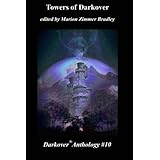Readers often give the novella short shrift as a literary form. It’s too long to read easily in one sitting and not long enough to make a satisfying novel-variety reading experience. It’s also hard to write. You need a single plot line that’s rich enough to sustain the length but doesn’t meander off into the subplots and so forth that give a novel its complexity.
The short review: A new Bujold novella set in the world of The Curse of Chalion! (Everyone jumps up and down for joy and runs out to buy it!)
The longer review: To say Bujold is a master of her craft is an understatement, also that she
has the ability to take what seems to be a simple enough proposition (in this
case, tracking down a murder suspect) and imbuing it with emotional resonance.
Her work rarely leaves me unmoved, and this one is no different. She manages to
bring the reader into her world of five gods, shamans and sorcerers and spirit
animals (as a dog lover, I adored what she did with more-dog and Great Beast
dog) and ordinary folk without ever inflicting massive backstory or infodump.
The richness of this world and its potential for powerful human stories never
fails to amaze me. The alternative viewpoint characters (Penric, a
sorcerer-divine who is host to demon Desdemona, who carries the memories of all
her previous partners; Locator Oswyl, beset by his own rigid sense of honor and
his limited abilities; and Inglis, a shaman now bereft of his powers,
struggling to keep the ghost of his best friend from being eternally sundered
from grace, at the cost of his own blood) provide both close-up emotional
intimacy and a wider perspective of events. Did I say I loved the dogs. And the
ghosts. And the demon. And the dogs.
In Calabria, by Peter S. Beagle,
Tachyon. The short review: A new Peter S. Beagle novella-- with unicorns! (Everyone jumps up and down for joy and runs out to buy it!)
The longer review: Claudio
Bianchi, a crusty not-so-old hermit, farms an
aging plot of land in rural Southern Italy. At first glance, he is not
very prepossessing; he’s crotchety, battered, and solitary. He also has a
secret: he writes poetry. One day a unicorn appears on his land, and she too
has a secret, one that will forever transform their lives. Like everything else
by Peter S. Beagle I’ve ever read, this short work brims with earthy magic and
tenderness. He has the ability to take a character who at first glance is not
particularly appealing (middle-aged, grouchy hermit with dubious social skills
and personal hygiene) and draw us into that character’s world, weaving the
threads of our own disappointments, humdrum lives, deferred dreams. Claudio has
all but given up on his dreams, so much so that he no longer knows what they
once were until the impossibly magical creature touches the dreamer within him.
In Calabria is not The Last Unicorn, but they share that
sense of longing and transcendence, and offer the same thoughtful, immensely
satisfying reading experience.







.jpg/410px-Early_flight_02562u_(7).jpg)
